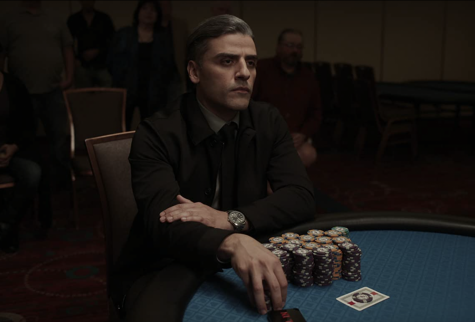REVIEW: Oscar Isaac shines amidst the darkness and brutality of ‘The Card Counter’
Written and directed by Paul Schrader, ‘The Card Counter’ will surprise those who are unfamiliar with his work. A signature of Schrader’s work, which includes writing credits on many Martin Scorcese films including “Taxi Driver” and his recently directed film “First Reformed,” is his ability to depict a lone protagonist confronting their own dark destiny as they recognize the flaws in society. Despite its namesake, and the slick style portrayed in its trailer, the film is only about high-stakes poker on surface level. More than anything, it’s the character study of a broken man and a critique on the inhumanity of military interrogation in the Iraq War.
William Tell (Oscar Isaac) is an ex-military interrogator searching for a new purpose in life after his release from prison. During his stretch, he developed a talent for counting cards and took up gambling to pass the time. After his release, he bides his time by driving to different casinos and gambling dens. His gambling prowess is noticed by La Linda (Tiffany Haddish), a gambling agent who partners with him to get into higher stakes games where she gets a cut of the winnings. Meanwhile, Tell meets a young man named Cirk (Tye Sheridan) who is on a path for revenge against Major John Gordo (Willem Dafoe), a figure from Tell’s past. Tell hopes to use his gambling winnings to create a better life for Cirk, as well as escape his own tragic past as the “fall guy” for the military’s abuse of power during the Iraq War.
Schrader relies on his own signature tropes, such as the self-destructive protagonist and nihilism-themed narration, but he still manages to craft a story that evaluates the flaws in modern society. William falls in line with the same anti-hero character type Schrader established with “Taxi Driver’s” Travis Bickle—a man caught in a routine lifestyle while confined to a seedy environment before seeking an eventual redemption. William’s path to redemption is shaped by the presence of the love interest La Linda and Cirk as a person he can guide to righteousness. If gambling is what helps William cope with a disturbing past, then fixing Cirk’s life and settling down with La Linda could be what sets him free from his pain.

Gambling is only a companion to the story and not the main focus. Gambling is William’s way of life, but there’s nothing that implies he has an addiction to the thrill of winning, or a moment where he’s enraged due to a loss. Instead of gambling, the real theme lies in why he’s so broken.
The film’s brutal elements are present in William’s flashbacks to being an interrogator at Abu Ghraib prison, where Iraqi prisoners were abused and tortured by members of the U.S. Army and CIA. The prison is introduced in graphic and nauseating detail via a tracking shot through a fisheye lens. Viewers witness unprovoked beatings, music torture and humiliation at the hands of U.S. personnel; the soldiers’ enjoyment of the acts adds a horrific layer to the scene. William’s enjoyment of the crude acts lead to him being the “fall guy” when the prison operations are exposed.
Not only does the film critique the Iraqi prisoners’ dehumanization, but military conditioning as well. William is a product of military training, but he inherits traits that continue to haunt him. He becomes a tool in the most disturbing way possible. It becomes apparent that gambling is literally his escape from the past as his training is possibly the only other thing he knows. Consequently, in following orders, he’s used as a scapegoat by his own organization. This grim scenario is not far from reality.
Between 2004 and 2006, 11 soldiers present at the prison faced charges that included dereliction of duty, battery, aggravated assault and maltreatment. While some of the soldiers court-martialed, sent to military prison and dishonorably discharged, higher-ranking officials faced less severe punishment or avoided repercussions altogether. The enhanced interrogation techniques were said to be authorized by the U.S. Department of Justice, which allowed the soldiers to carry out indecent acts on the foreign detainees.

William may be one of the most compelling characters Isaac has portrayed in his career. Isaac has displayed versatility across several films such as, “Ex Machina,” the latest “Star Wars” trilogy and “Inside Llewyn Davis.” Isaac lends a slick coolness to the William character, along with a steely world weariness to match. Isaac exudes confidence in the poker scenes as he narrates each maneuver in a way that makes the game seem like strategic art rather than a simple routine. His confidence is accompanied by swagger as he walks into the card games as a focused man, defined by his masculine mystique. His unflinching stare gives emotional weight to his lines while alluding to a hidden darkness within the character. At times, it seems he’s channeling the intense gaze of a young Al Pacino in “The Godfather.” Isaac embodies the anti-hero character and makes the role his own in an award-worthy performance.
“The Card Counter” is a character study that does not hold back on its subject matter. The film’s violence may not be for everyone, but it is an acknowledgement of one of the U.S.’s darkest and most regrettable moments. Schrader’s signature characterization produces a moody film that illuminates Isaac’s status as a diverse actor.








